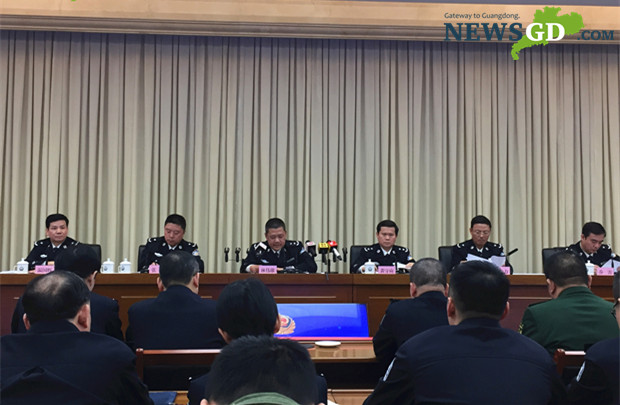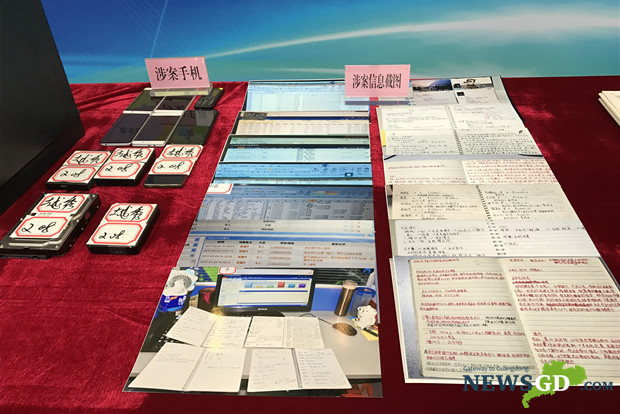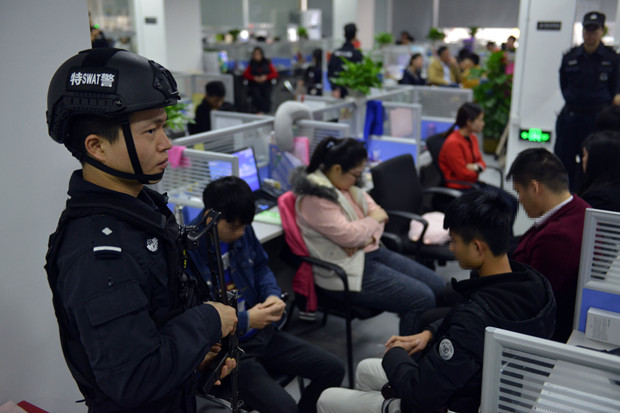Guangdong police will continue launching “Jufeng 2017”, the annual special campaign on cracking down crimes this year, said Guangdong Provincial Public Security Department on Feb 28.
Lin Weixiong, deputy director general of Guangdong Provincial Public Security Department, introduced that the special campaign will focus on fighting telecommunication fraud, financial crime, burglary & robbery and gang crime.
Guangdong Provincial Public Security Department held press conference to introduce "Jufeng 2017" on Feb 28. (Photograph by Shen Chen)
Lin also stressed that more new techniques such as big data and joint operation platform will be utilized to hit crimes accurately. Furthermore, Guangdong police vowed to keep enhancing cooperation with foreign police to against transnational crime and arrest absconders in 2017.
“More new means are utilized to defraud citizens now,” said Zhangrui, political commissar of the department’s criminal investigation bureau. “Frauds would steal citizens’ information or money through sending Trojan virus via SMS or asking them to scan QR-Code.”
Guangdong police displayed tools for criminal purpose. (Photograph by Steven)
Zhang also introduced a typical trap found recently. It is said that fraudsters would send a SMS to ask you if you are willing to bind his/her telephone number. If you reply Y, two telephone numbers will link together. Once you switch off the phone, the fraudster can receive all the messages which belong to you, including banking information and verification code.
Zhang indicated that Guangdong police will keep their eyes on these new cheating traps and issue latest information timely.
“We are going to strengthen the publicity of fraud prevention in this year.” Zhang added.
In recent anti-crime operation this year, 6 gangs involved in selling personal information, have been cracked down under the cooperation among Guangdong police and their counterparts from other 19 provinces and cities, according to Guangdong Provincial Public Security Department.
More than 138 suspects were detained, while 100 million pieces of personal information which had been stolen were seized.
Guangdong police cracked down a company involved in selling personal information. (Photograph by Qian Wenpan)
Furthermore, Lin indicated that code-name “Thunder 17”, a joint operation on anti-crime among Guangdong, Hong Kong and Macao will be launched in March.
In order to combat increasing telecommunication fraud and cyber crime, Guangdong Provincial Public Security Department has established the Guangdong Center for Combating Telecommunication Fraud and Cyber Crime last year.
Related news:
2.Data shows you how popular "Jufeng 2016" exhibition is
In 2016, Guangdong police has captured 829 suspects involved in privacy leakage and found 340,000,000 pieces of personal information leaked, stolen or sold. 7 cross-national crackdowns on telecom frauds in Southeast Asia, Europe and Africa had been launched, while 296 suspects have been detained.
BY Steven
How to avoid telecom fraud?
According to Guangdong police, people should remember 3 “hand up”, 2 “don’t” and 9 “don’t trust”. They are:
- 3 “hand up”, 2 “don’t”
1.When someone mention bank card on the phone, hand up quickly.
2.When someone say you win a prize, hand up quickly.
3.When someone say they are civil servants and require you to make remittance, hand up quickly.
4.Don’t click any links in messages and delete them quickly.
5.Don’t click any links sent by strangers on WeChat.
6.It must be fraud if someone mention “safe account”.
- Remember 9 “don’t trust”
1.If someone say they are civil servants and require you to make remittance, don’t trust.
2.If someone require you to make remittance to “safe account”, don’t trust.
3.If someone say you win a prize, don’t trust.
4.If someone require you to make payment before accepting prize, don’t trust.
5.If someone tell you your families meet an accident and require you to make remittance, don’t trust.
6.If someone ask information of your bank card and PIN, don’t trust.
7.If someone say they are your boss and require you to make remittance, don’t trust.
8.If someone require a personal inspection before opening an online banking, don’t trust.
9.If websites require you to register banking information, don’t trust.



















